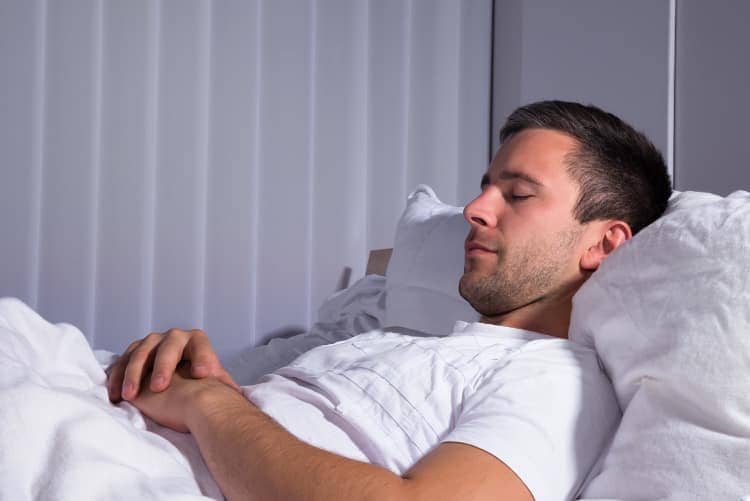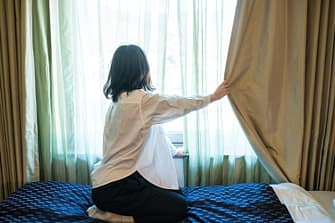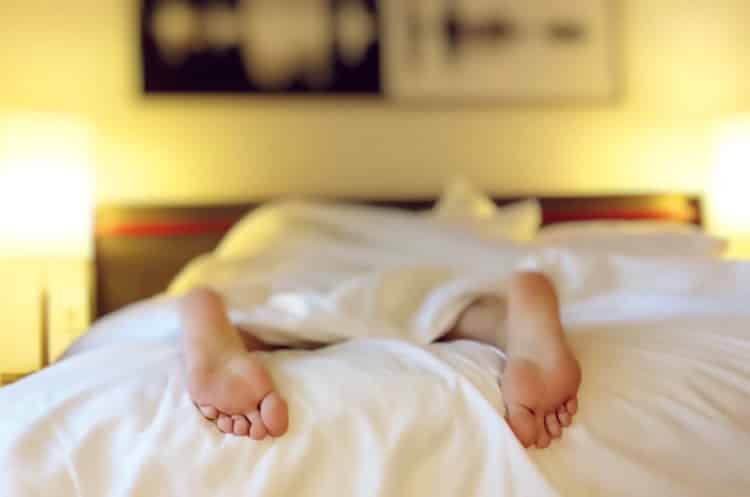How to Fall Asleep Fast: 7 Tips You Can Use Tonight without Pills

Do you want to be able to fall asleep faster, but don’t know how?
Maybe you’ve tried sleep aids in the past that didn’t work. Alternately, you might be hesitant to try medication because you’re wary of the side effects or becoming dependent.
In this article, we provide seven natural ways to fall asleep faster tonight, without having to take sleeping pills or use medication.
Curious if hypnosis could help you sleep well?
Take our hypnotizability test and find out!
1. Cool Your Room
Whether you’re too hot or too cold, the wrong temperature can make it hard to fall asleep. Maybe you’re trying to save money on your heating or cooling bill, leaving your bedroom too chilly in the winter and steamy in the summer.
Your thermostat can actually make or break good sleep. In general, the suggested bedroom temperature should be between 60 and 67 degrees Fahrenheit (15–19 degrees Celcius).
Why?
Your body temperature actually decreases to initiate sleep, and a cooler temperature can actually help facilitate this. If your room is too warm, it can take longer for your body to reach the ideal temperature so you can get some shuteye.
2. Block Out The Light
 Your body is programmed to sleep when it’s dark, and blocking out the light in your bedroom can help you fall asleep faster. Light also inhibits the secretion of melatonin, a hormone that naturally promotes a healthy sleep-wake cycle.
Your body is programmed to sleep when it’s dark, and blocking out the light in your bedroom can help you fall asleep faster. Light also inhibits the secretion of melatonin, a hormone that naturally promotes a healthy sleep-wake cycle.
What can you do to block out light?
About two hours before bed, turn off electronics and other devices that emit light. When it’s time to fall asleep, use blackout curtains or shades or, for a cheaper option you can take with you while traveling, wear an eye mask.
3. Box Breathing
Box breathing is a deep breathing exercise. It’s a powerful stress reliever that can help you relax so you can fall asleep faster. This exercise stimulates the vagus nerve, which triggers relaxation by strengthening the parasympathetic nervous system.
How does box breathing work?
- First, slowly exhale, getting all the oxygen out of your lungs.
- Now, inhale slowly and deeply through your nose, counting to four very slowly in your head.
- Feel the air fill your lungs, one section at a time, until your lungs are completely full and the air moves into your abdomen.
- Then, hold your breath for another slow count of four.
- Exhale through your mouth for the same slow count of four, expelling the air from your lungs and abdomen.
- Finally, hold your breath for another four-count before repeating this process.
Deep breathing helps calm and regulate the autonomic nervous system. This system regulates involuntary body functions like temperature and blood pressure. When used as part of a healthy sleep routine, box breathing can provide an almost-immediate sense of calm that’s conducive to good, restful sleep.
4. Progressive Muscle Relaxation
Tensing and relaxing your muscles can relieve stress and improve sleep.
Here’s how it works:
- While slowly inhaling, contract one muscle group (for example, your calves) for 5 seconds to 10 seconds, then exhale and release the tension in that muscle group.
- Give yourself 10 seconds to 20 seconds to relax, and then move up to the next muscle group (for example, your upper thighs or buttocks).
- While releasing the tension, focus on the changes you feel when the muscle group is relaxed.
- Work your way up the body, contracting and relaxing muscle groups.
Progressive muscle relaxation is also an excellent tool to help you learn about your body and what it needs to relax. And remember, it’s ok if you fall asleep before you finish all of your muscle groups.
5. Sleep Hypnosis
 Hypnosis can be very successful in allowing you to fall asleep faster, stay asleep longer, and feel more rejuvenated and alert throughout your day.
Hypnosis can be very successful in allowing you to fall asleep faster, stay asleep longer, and feel more rejuvenated and alert throughout your day.
It’s a non-invasive, low-cost method that mirrors the body’s natural process for falling asleep.
How does it work?
When listening to a sleep hypnosis audio, like that offered by SuccessMinds, you are guided into a state of deep relaxation. It can be extremely difficult to learn how to relax, especially if you suffer from a sleep disorder. Sleep hypnosis audio focuses on helping you relax—physically and mentally—so you can drift off faster and wake up feeling more rested.
6. Eat a Small Amount of Protein and Fat Before Bed
While eating too much before bed can affect your quality of sleep or cause you to wake up in the middle of the night, eating a small amount of protein and fat—like 6–10 almonds—can actually help you stay asleep if you’re prone to waking too early.
Why?
When your blood sugar dips too low during the night, it can trigger an adrenaline response, which can wake you up. Unlike eating carbohydrates or sugary treats, a small amount of protein and fat works to satisfy late-night hunger while preventing a night-time drop in blood sugar.
With just a little bit of protein and fat before bed, you can avoid waking during the night.
7. Pay Attention to Sleep Hygiene
Sleep hygiene is defined as all of the habits and practices that are conducive to sleeping well on a regular basis.
Good sleep hygiene habits include:
- Establishing a regular bedtime routine
- Exercise regularly (but not too close to bedtime)
- Eating healthy
- Avoiding caffeine, nicotine, and alcohol close to bedtime
- Blocking out light
- Controlling the temperature in your bedroom
- And practicing relaxation techniques, such as box breathing or progressive muscle relaxation
For more tips on how to practice better sleep hygiene, check out our 11 tips for a better night’s sleep.
No More Tossing and Turning
There’s nothing better than a good night’s rest! We hope these tips improve your sleep by helping you drift off faster and wake up feeling refreshed and rejuvenated.
Learn more about how to Fall Asleep Faster (and Sleep Better) with Nature’s Gateway to Sleep: Hypnosis.
Curious if hypnosis could help you sleep well?
Take our hypnotizability test and find out!

